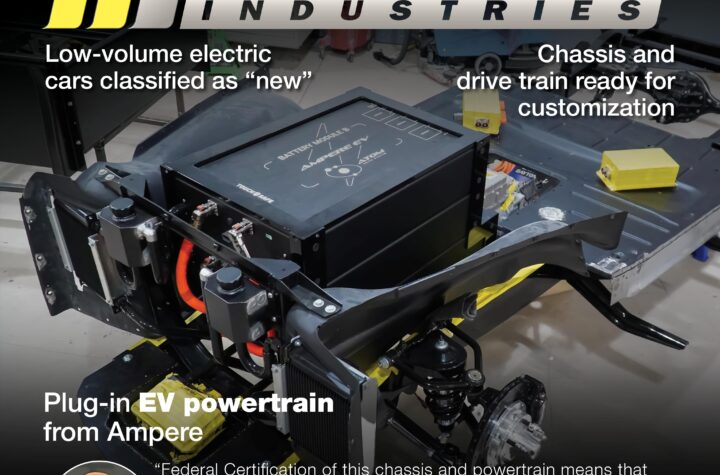
NSF International, an independent testing and certification organization with more than 20 years of automotive experience, has certified its first steel fender under the NSF Automotive Collision Replacement Parts Certification Program. The NSF program certifies that auto collision parts, such as Tong Yang Industry Co.’s steel fenders, meet rigid quality, safety and performance standards through rigorous facility audits and parts testing.
NSF International engineers independently evaluate collision replacement parts against original equipment (OE) service parts to ensure the highest level of performance in terms of form, fit and function. In addition to steel fenders, the NSF Automotive Collision Replacement Parts Certification Program also tests and certifies other sheet metal components, steel bumpers, step bumpers, brackets, reinforcement bars (rebars), plastic components, lighting and absorbers.
Certification Requirements
To earn certification, Tong Yang Industry Co.’s steel fenders were independently reviewed and tested against OE service parts. NSF International audited Tong Yang’s OE-ready manufacturing facilities and quality systems to ensure that they meet or exceed each of NSF’s stringent requirements.
“Tong Yang has already earned NSF certification for its front and rear rebars, front and rear bumper absorbers, front bumper and brackets. Tong Yang’s new fender certification is another example of their commitment to supplying the highest quality collision replacement parts to the aftermarket,” said Bob Frayer, Director of NSF International’s Automotive Collision Certification Programs and Engineering Laboratories.
Benefits of NSF Certification
Tong Yang’s NSF Certified steel fenders, rebars, bumper absorbers and brackets are authorized to display the NSF Mark, which indicates they’ve met NSF International’s certification requirements. These parts also are listed on NSF’s certification listings webpage.
To maintain certification, Tong Yang Industry Co. will undergo quarterly facility audits and random, in-market parts testing, validating quality and integrity.
Automotive Collision Parts Distributor Certification
NSF also offers Automotive Collision Parts Distributor Certification, which requires distributors to have quality management systems in place that address traceability, service and quality issues including:
• an effective records systems and inventory tracking systems to track orders and parts through the supply chain,
• an ISO 9001-certified quality management system,
• a defective parts procedure including a customer parts complaint process,
• the ability to administer a manufacturer’s recall, and
• when necessary, a formal corrective action to complaints and an immediate recall plan.
Manufacturers or distributors of automotive collision parts seeking information on NSF International’s Automotive Collision Certification Programs can visit NSF International’s website or contact Bob Frayer at 734-827-6825 or autocert@nsf.org.
About Tong Yang Industry Co.: Committed to providing the best quality of automotive collision parts to consumers, Tong Yang Industry Co. operates 17 production points in China, most of which are joint ventures with the top-10 automakers there.
About NSF International Strategic Registrations (NSF-ISR): NSF-ISR, an NSF International Company, offers a comprehensive portfolio of management systems registration solutions to meet the demands of the global marketplace (nsf-isr.org). NSF-ISR is recognized by the International Automotive Task Force (IATF) to provide ISO/TS 16949 registrations in the automotive sector. NSF-ISR provides registrations for the following programs: ISO 9001, AS 9100/10/20, ISO 13485, ISO 20000-1, ISO 22000, FSSC 22000, ISO 14001, Responsible Care (RC) 14001, Responsible Care Management Systems (RCMS), OHSAS 18001, American Tree Farm System and Sustainable Forestry Initiative (SFI) through ANAB accreditation as well as Greenhouse Gas Verification/Validation and SFI Chain of Custody (CoC) through ANSI accreditation.
About NSF International: NSF International is an independent public health and safety organization that writes standards, tests and certifies products for the food, water and consumer goods industries to minimize adverse health effects and protect the environment (nsf.org). Founded in 1944, NSF is committed to protecting human health and safety worldwide and operates in more than 150 countries. NSF is a World Health Organization Collaborating Centre for Food and Water Safety and Indoor Environment.















More Stories
ROHM’s PMICs for SoCs Adopted in Reference Designs for Telechips’ Next-Generation Cockpits
Southfield Classics utilizes Ampere EV engineering to become the first manufacturer to achieve Low Volume Vehicle Manufacturer Certification
Mosaic Click board from MIKROE delivers global coverage multi-band and multi-constellation tracking ability